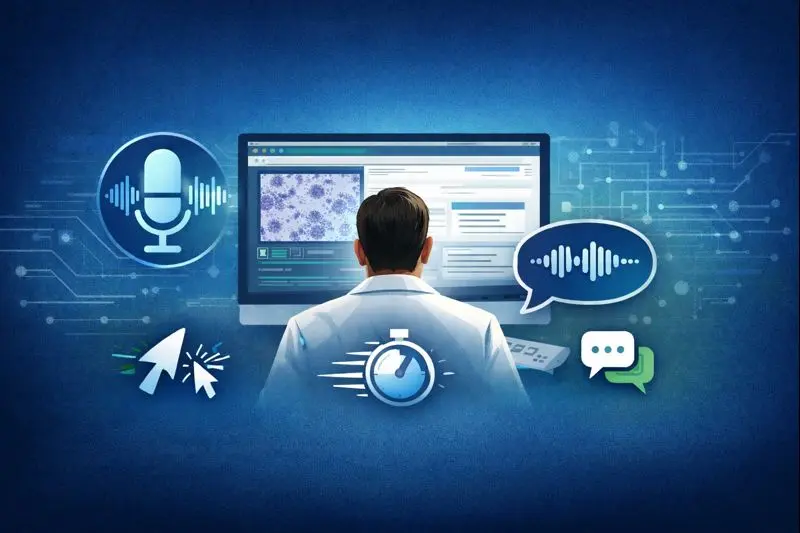Blog
The Future of Medical Labs: Embracing Tech & Personalization
July 14, 2025
What if your clinical lab or pathology practice could predict the future?
The world of diagnostics is on the brink of a seismic shift. Medical laboratories once bound by traditional methods are now at the forefront of a digital renaissance. This transformation isn't just about new pathology lab software tools - it's about reimagining the very essence of healthcare.
Join us as we explore the nexus of technology, innovation, and personalized care that’s reshaping the landscape of modern diagnostics.
The Digital Evolution of Medical Labs
Clinical laboratories and pathology groups are undergoing a profound digital transformation as they adopt new technologies that have the power to fundamentally redefine how labs operate and deliver value for their customers.
Let's take a closer look at the key facets of this digital evolution.
Laboratory Information Systems: More Than Just Traditional LIS Software
As healthcare undergoes a digital transformation, medical laboratories are emerging as key drivers of innovation. At the heart of this evolution are laboratory information systems (LIS software), now essential tools for both anatomic pathology and clinical laboratory management.
The Multifaceted Role of Laboratory Information System Software
- Data Management & Beyond: While the primary function of a medical LIS system is to manage patient data, its capabilities extend far beyond this basic task. It also serves as the digital spinal system of the lab, organizing, analyzing, and safeguarding every piece of information and every sample that flows through.
- Workflow Standardization: In settings where precision is paramount, LIS pathology systems ensure that every process, from order entry to sample collection to result dissemination, follows a standard and efficient pattern. This standardization not only boosts productivity but also minimizes errors.
- Upholding Quality Control: Quality assurance is non-negotiable in pathology labs. LIS lab software plays a pivotal role in ensuring that every test, procedure, and diagnostic analysis meets or exceeds the industry's stringent standards for the accuracy of all test results.
- Regulatory Compliance: Laboratories require dependable tools to stay aligned with growing healthcare regulations. Laboratory information system software helps ensure compliance with current standards and guidelines, reducing the risk of costly legal or accreditation issues.
The Distinctive Edge of Advanced Laboratory Information System Software
While traditional LIS systems perform the tasks listed above competently, the best laboratory information system software (best LIS software) offers something extra: adaptability. These advanced LIS systems are reactive, addressing present challenges, and proactive, anticipating future shifts in the healthcare landscape.
Their forward-thinking design, coupled with regular updates, ensures that labs are future-ready and always equipped with the latest laboratory workflow management platform to handle both current demands and upcoming challenges.
Learn More: Does Your Laboratory Information System Support the Latest LIS System Technology?

LIS Systems and the Emergence of Tech-Driven Laboratories
The laboratories of the future are those that seamlessly integrate advanced lab information system technology into their core operations.
The Promise of Advanced Lab Information System Technology in Labs
- Precision at its Best: With the integration of advanced LIS medical technologies, labs can achieve unparalleled levels of accuracy. From rules and automation that reduce human error to sophisticated anatomic pathology software solutions that can quickly query and analyze complex data, this level of technology ensures that every lab test is conducted with the utmost reliability and precision.
- Prioritizing Patient Outcomes: The core mission of every pathology lab is to deliver accurate, timely diagnostics that support better patient care. With advanced pathology information system software, labs can accelerate turnaround times and improve diagnostic precision, empowering providers to make informed decisions and enhancing overall health outcomes. This level of service also builds trust and long-term loyalty among clients.
- Streamlining for Success: Achieving operational efficiency is possible when integrating LIS laboratory information system technology. Automated processes create faster turnaround times and more overall productivity. The best LIS systems also feature advanced analytics capabilities that provide valuable insights into clinical lab workflow bottlenecks, allowing for corrections and optimization. The result? Reduced operational costs, maximized resource utilization, and an enhanced potential for in-house laboratory billing and revenue generation.
Learn More: Maximizing Your Lab’s Profitability: The Case for In-House Lab Billing
Moving Beyond the Immediate LIS System Benefits
While the immediate advantages of advanced LIS systems are evident, there are long-term implications as well:
- Scalability: As labs increase capacity and handle larger volumes of tests, the best LIS software solutions can easily scale to meet the rising demands.
- Data Management: With the influx of vast amounts of data, the best LIS systems can store, analyze, and retrieve information efficiently, turning raw data into actionable insights thanks to their expansive bandwidth and well-earned reputation for nearly 100 percent uptime.
- Collaboration: The best LIS system technology facilitates better communication between departments, multi-facility operations, and among healthcare providers, fostering a more cohesive healthcare ecosystem.
Learn More: Stability and Performance: The Two Most Important Aspects of a Modern Laboratory Operation
Labs as Data & Technology Hubs
Traditionally anchored in diagnostics, clinical laboratories and anatomic pathology groups are now expanding their horizons, driven by the digital revolution. As they integrate data and technological innovation, these labs are set to redefine best business practices and patient care.
The Core & The Evolution
At the heart of every clinical laboratory and pathology group is diagnostic capability. This foundational role ensures that every test result leads to a proper diagnosis.
However, the modern lab's informatics role doesn't stop there:
- Data Mastery: Modern labs utilize the best laboratory information system software to harness the data they produce and store, offering deeper insights into population health and personalized care.
- Technological Synergy: Advanced lab information system tools, from AI-driven digital pathology solutions to machine learning (ML) functionality, are being integrated into modern LIS systems, elevating the lab's capabilities and expanding its role in the healthcare continuum.
Learn More: How AI Can Propel Medical Laboratories into a New Era of Growth
It should be noted that transitioning to a tech-centric LIS model does require clearing some hurdles.
Strategic partnerships with technology experts—particularly those specializing in customized pathology lab report software—are increasingly vital for laboratories. At the same time, it's critical that these innovations support and strengthen core diagnostic operations, rather than distract from them.
The Future Landscape
The promise of this tech-driven evolution is vast:
- Enhanced Patient Care: With richer data and access to advanced tools, next-gen labs can offer more precise diagnostics, translating to better patient care.
- Operational Excellence: This technology integration promises streamlined processes, reduced errors, and a growth in reputation for early adopters.
Beyond these immediate benefits, the data-centric approach of modern labs holds the potential for a groundbreaking new lab workflow and further discoveries.
White Paper: Vendor to Partner - How Aligning with Your LIS System Provider Can Transform Your Lab

The Rise of Laboratory Information System Automation
Today's clinical laboratories and pathology groups are undergoing a significant transformation, and at the heart of this change is the automation of LIS systems.
But what's driving this shift, and why is it so crucial for the future of diagnostics?
Why the Move to Automation of LIS Systems?
The push toward laboratory information system automation is keeping up with technology and addressing real-world challenges:
- Precision Matters: There's no room for error with diagnostic lab software. Automated labs with advanced laboratory information system software ensure reliability and accuracy by eliminating human intervention through automation, which simplifies complex processes such as test result auto-verification and the assignment of proper Current Procedural Terminology (CPT) and International Classification of Diseases (ICD) codes for laboratory revenue cycle management (lab RCM).
- Time is of the Essence: In healthcare, every second counts. LIS system automation streamlines clinical lab workflow processes, delivering results faster without sacrificing accuracy.
- Cost Concerns: Running a lab is a costly endeavor. By reducing manual work and automating core processes, labs can operate more efficiently and save on operating costs.
- Consistent Results, Every Time: LIS software automation ensures every test is processed with consistency and reliability, regardless of volume or timing.
- Always On, Always Ready: Automated labs can operate continuously, ensuring they're always ready to meet fluctuations in volumes and stat test cases.
The Multifaceted Benefits of Lab Information System Automation
Embracing lab information system automation offers a host of tangible advantages:
- Complexity Simplified: Many laboratory tests involve intricate steps. Medical Laboratory information system automation, complemented by advanced robotics, simplifies these processes, from sample preparation to result analysis.
- Eliminating Human Error: Manual processes are prone to errors. Medical LIS automation, with its precision and consistency, mitigates these risks. Furthermore, comprehensive pathology lab software solutions introduce tighter controls and validation steps, ensuring proper sample tracking and handling, minimizing the chance of specimen misplacement.
- Empowering Technicians: By automating repetitive and redundant tasks, an LIS system with automation frees lab technicians to focus on more complex work, boosting both productivity and, often, job satisfaction.
- Cost Effectiveness: Beyond labor savings, medical LIS software automation reduces the waste of reagents and other consumables in tests, further driving down operational costs.
As we look to the future, the role of automation in clinical laboratories and pathology groups is set to become even more pronounced, ensuring accuracy, speed, and cost-effectiveness in diagnostics.
Learn More: How Laboratory Information Systems Help Lab Operators Overcome Industry-Wide Staffing Shortages
AI & Machine Learning: The Game Changers
The integration of Artificial Intelligence (AI) and Machine Learning (ML) is revolutionizing the LIS pathology workflow. These advanced technologies, supported by modern laboratory information systems, are reshaping the way pathologists and medical directors diagnose, interpret, and collaborate.
Let's dive deeper into their transformative impact:
1. Image Analysis: A New Lens for Pathologists
Pathologists aided by AI are now equipped with a sharper, more precise lens to examine tissue samples.
- Depth and Detail: AI delves into samples, using algorithms to detect patterns and anomalies that might escape the human eye, including cancer cells in hard-to-see areas.
- Spotting the Uncommon: Rare diseases that might not frequently cross a pathologist's desk are now more easily identified with AI assistance. AI's pattern recognition can pinpoint signs of these rare conditions, increasing the likelihood of detection.
- Speed and Accuracy: With AI's assistance, diagnoses are more accurate, faster, and can now more easily include collaboration among doctors, leading to timely interventions and better patient outcomes.
Industry Insights: Digital Pathology Redefined - Uniting AI, Viewers, and a Robust LIS System for a Seamless Workflow
2. Data Interpretation: Making Sense of the Deluge
In a data-rich environment, AI stands out as the ultimate data interpreter, making sense of vast amounts of complex information.
- Handling Data Overload: AI efficiently sifts through vast datasets, ensuring all data is analyzed efficiently.
- Microorganism Detection: AI can identify even the tiniest microorganisms, ensuring comprehensive and reliable diagnostic results.
- Paving the Way for Personalized Treatments: By helping identify new biomarkers, AI is enabling treatments tailored to individual patient needs.
Industry Insights: The AI Revolution in Laboratory Billing - A Game Changer for 2025 and Beyond
3. Collaboration & Knowledge Expansion: Bridging Minds
AI improves individual expertise and fosters a collaborative environment.
- Global Diagnostic Trends: AI’s capacity to analyze large-scale datasets uncovers broad diagnostic patterns, providing a more comprehensive understanding of diseases than ever before.
- Advancing Shared Insight: By revealing complex patterns and insights that are easily shareable across institutions, AI promotes collaboration among pathologists and strengthens collective diagnostic expertise.
- Improving Quality Assurance: AI streamlines case sorting and enables comparison between machine-generated and human diagnoses, reinforcing accuracy and consistency in results.
White Paper: Keys to Keeping Your LIS System Implementation on Track
Personalized Medicine: Pioneering Individualized Healthcare
Personalized medicine prioritizes individual needs, ensuring every patient receives care tailored to their unique health profile.
Let's explore the facets of this revolution and how it relates to the medical lab:
Embracing Tailored Healthcare
The one-size-fits-all approach is becoming obsolete. Today's healthcare providers understand and cater to individual nuances.
- Telemedicine: Virtual consultations ensure patients receive timely care, irrespective of geographical barriers.
- Remote Monitoring: Wearable devices and health apps track real-time health metrics, offering a snapshot and deep insights into a patient's well-being.
- Genomic Breakthroughs: Advancements in genomics are enabling treatments based on an individual's genetic makeup, heralding a new era of precision medicine.
Industry Insights: The Future of Laboratory Diagnostics - Emerging Technologies and Patient-Centric Care
The Power of Customized Reporting
Modern medical labs are transcending traditional diagnostics to offer deep and personal insights.
- Comprehensive Health Narratives: Modern lab reports now integrate genetics, lifestyle factors, and medical history to present a complete picture of a patient’s health.
- Contextualized Insights: Reports go beyond raw data, offering expert interpretations that highlight the relevance of results within the patient’s unique health profile.
- Personalized Recommendations: Tailored guidance, such as diet, exercise, or lifestyle adjustments, empowers patients to make informed decisions and actively manage their well-being.
Learn More: How LigoLab's Pathology Lab Software Supports Lab Report Customization and Client Preferences
Educating for Empowerment
With the influx of data and insights, patient education becomes paramount.
- Contextualized Education: Labs can offer materials tailored to a patient's specific health condition and history, ensuring they fully grasp the implications of their test results.
- Actionable Insights: By contextualizing results and offering actionable recommendations, labs can guide patients toward healthier choices and informed health decisions.

Modern Laboratory Information Systems vs. Legacy LIS Systems: Navigating the Future of Labs
The distinction between modern laboratory information systems and legacy pathology LIS systems is more than just a tech choice. It's a strategic decision that can shape a lab's future trajectory of success.
Legacy Pathology LIS Systems: A Glimpse of the Past
Legacy pathology LIS systems, once the backbone of lab operations, have served their purpose in a different era.
However, as the pace of technological advancement accelerates, these aging medical LIS solutions reveal inherent challenges:
- Adaptability Issues: Modern labs require LIS systems that quickly adapt to new methodologies and practices. Legacy laboratory information system software, with its rigid and fixed architectures, can’t incorporate these changes, leaving labs at a disadvantage.
- Scalability Concerns: With the ever-increasing volume of tests and lab data, labs require LIS pathology systems that can scale up seamlessly. The static nature of legacy LIS systems makes this expansion cumbersome and inefficient.
- Technological Lag: The world of diagnostic lab software is rapidly embracing innovations like AI, machine learning, and advanced analytics. Legacy LIS systems, being products of an earlier time, can’t integrate these cutting-edge new technologies, causing labs to miss out on valuable insights and efficiencies that would push their businesses forward.
For labs aiming to stay at the forefront of diagnostics, understanding these limitations is crucial. It underscores the need for a transition to more modern, flexible LIS software platforms that can meet current demands and anticipate those that will shape tomorrow.
Learn More: What You Need to Know Before Contracting with a Laboratory Information System (LIS) Company
Modern Laboratory Information Systems: The Promise of Tomorrow
Modern LIS software platforms are more than just pathology lab software upgrades; they represent a paradigm shift in how labs operate and innovate.
Here's why they stand out:
- Flexible Infrastructure: Modern medical LIS systems are built on a scalable and adaptable pathology lab software platform, ensuring they can seamlessly integrate new technologies as they emerge.
- Continuous Enhancement: These advanced LIS software platforms benefit from dedicated teams of engineers and informaticians who regularly update and enhance the laboratory information system, ensuring it remains at the forefront of industry advancements.
- Empowering User Support: Recognizing the challenges of growth and technological integration, modern medical LIS software platforms backed by the best laboratory information system companies offer comprehensive training and unlimited support, helping labs navigate bottlenecks and barriers as they grow.
- Partnership Dynamics: More than just service providers, modern laboratory information system vendors align with the lab's vision, acting as true partners who are deeply invested in the lab's success and growth.
Learn More: Comparing LigoLab Informatics Platform with Legacy Laboratory Information System Software
Selecting a legacy lab information system or a modern LIS software platform is more than a choice; it’s a strategic move that positions a lab for sustained innovation, profitability, and leadership in an evolving diagnostics landscape.
By embracing the best LIS software platforms, labs are not only optimizing their present operations but also laying the foundation for a future where they will play a pivotal role in advancing medicine and ensuring patient safety.
Embracing the Future: Medical Labs and the Nexus of Innovation & Care
The evolution of clinical labs is clear: a shift from traditional methods to a future defined by technology and personalization. As labs transition from legacy LIS systems to modern medical LIS software platforms, they're not just adapting to change - they're pioneering it.
In this era of rapid innovation, the role of labs extends beyond diagnostics. They are becoming centers of excellence, where technology meets patient care, ensuring accuracy, speed, and tailored health insights.
Learn More: Navigating the Future of Pathology: The LigoLab Advantage
For labs ready to lead in this transformative age, LigoLab stands as a partner. Embrace the future, harness innovation, and redefine patient care with us.
.jpg)






